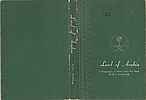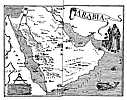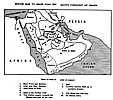Lord of Arabia
A Biography of Abdul Aziz Ibn Saud
by H. C. Armstrong
|
"I am", he continued raising his voice and repeating his favourite phrase, "I am a simple preacher. My mission is to spread the Faith, if possible by persuasion and if not by persuasion then by the sword".
With his arguments the Wahabis had no sympathy. For them all good Moslems were Wahabis. The rest were mushrekin, worse than heretics. They, the Wahabis, were the only true Moslems and the only true Arabs. The only sanctions they needed were their own consciences. |
An epilog
|
Near the end of World War II, U.S. Franklin D. Roosevelt traveled to Yalta,
in the Soviet Crimea, to negotiate the postwar world order and the creation of the United Nations
with Prime Minister Winston Churchill of Britain and the Soviet leader Josef Stalin.
On his way, Roosevelt visited with King Abdul Aziz ibn Saud, as described here. (Local copy) |
Presented in two forms
Adobe .pdf about 40 MegaBytes, in 14 files
| Part 00 | Part 01 | Part 02 | Part 03 | Part 04 | Part 05 | Part 06 |
| Part 07 | Part 08 | Part 09 | Part 10 | Part 11 | Part 12 | Part 13 |
ASCII, with pictures about 500,000 bytes
Please note: Optical Character Recognition (OCR) is an imperfect art. The book was not perfectly printed.
If there are questions - please view a printed copy or the .pdf above.
I corrected several "obvious" letter transpositions
in the general text - however, place and people names seemed to have been carefully proofed in the original
and seem to be at least self consistant. Some spelling may be "British" English, such as "axix" which was
used several times.
The book as printed is represented below the bar - there was no table of contents.
As an aid to reader navigation, I offer the following: (the Arabic numbers are page numbers, for links from
the Index)
Lord of Arabia
A Biography of Abdul Aziz Ibn Saud
IBN SAUD
An Intimate Study of a King
By H. C. ARMSTRONG
I desire to express my thanks to
TO DESCRIBE, so that he may live before the reader, a Moslem and an Arab of outstanding personality, in terms that
come within the everyday consciousness of Christians and
Europeans has not been easy.
FAR back in Time, when Europe lay shrivelled and cold
under the glaciers of the Age of ice, Arabia was a land of
forests and pastures, and watered by three great rivers.
CHAPTER I
FAMILY OF KING IBN SAUD
CHAPTER VI
CHAPTER XV


by H. C. Armstrong
TURKEY IN TRAVAIL
TURKEY AND SYRIA RE-BORN
GREY WOLF - MUSTAFA KEMAL
PUBLISHED BY
KHAYAT'S COLLEGE BOOK COOPERATIVE
32 and 34 Rue Bliss Beirut, Lebanon
Lord of Arabia
BY THE GRAHAM ASSOCIATES CORPORATION • BEIRUT, LEBANON
HIS MAJESTY KING ABDUL AZIZ
for his hospitality and many kindnesses
on my last visit to Arabia
for placing much material in my hands and treating me with unfailing kindness.

Map 1

Map of Arabia in 1900

Map showing King Ibn Saud's conquest of Arabia